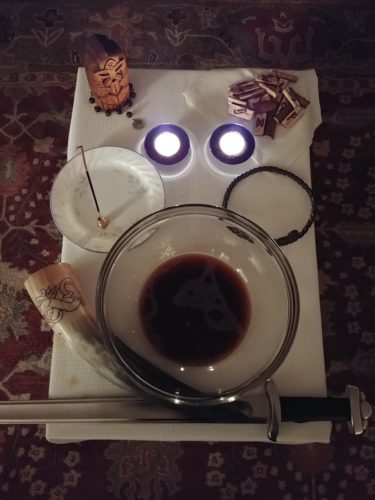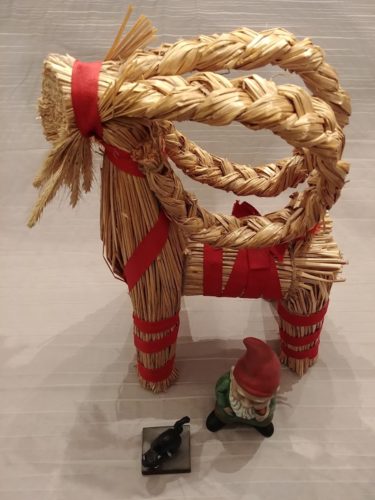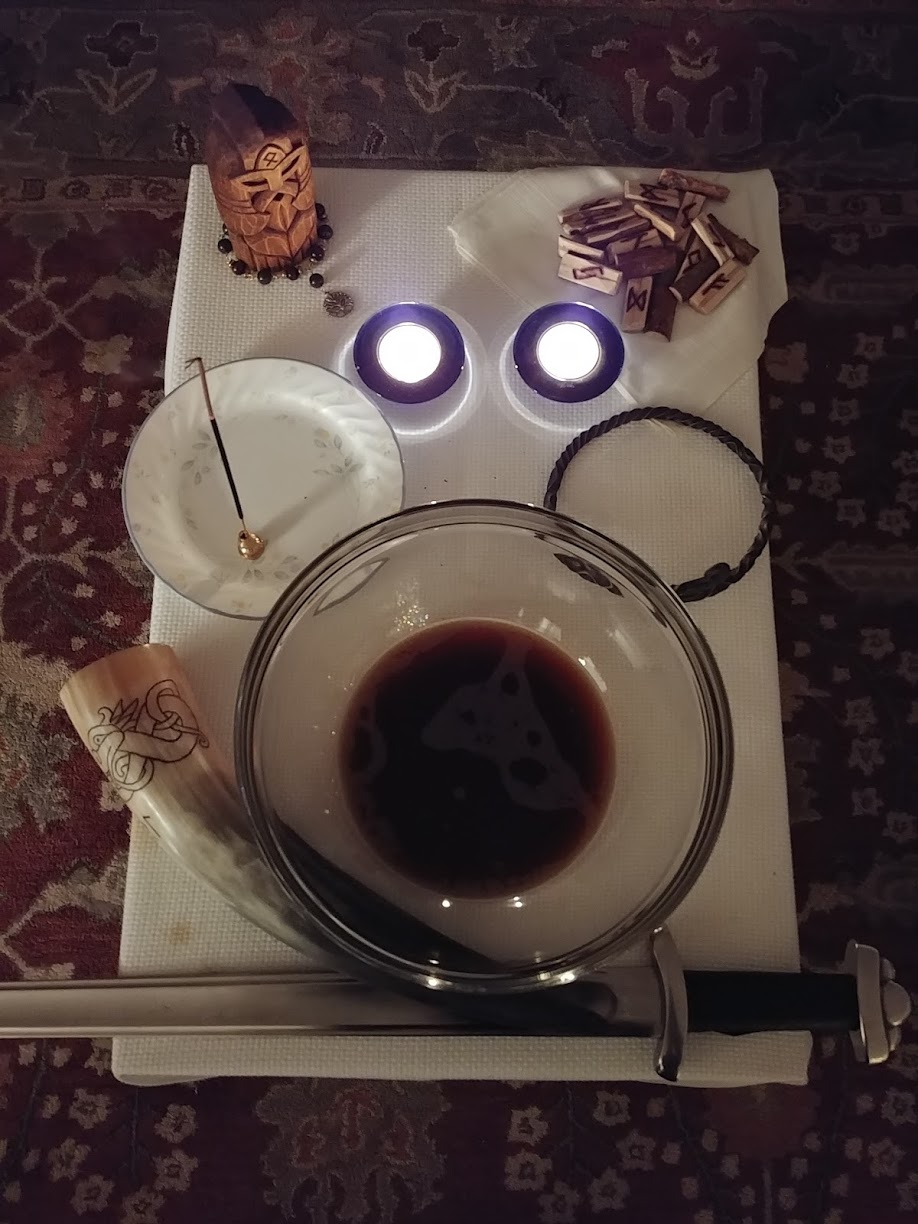Pagan Perspectives
Today’s column comes to us from Karl E.H. Seigfried, goði of Thor’s Oak Kindred in Chicago. In addition to his award-winning website, The Norse Mythology Blog, Karl has written for the BBC, Iceland Magazine, Journal of the Oriental Institute, On Religion, Religion Stylebook, and many other outlets. He holds degrees in literature, music, and religion, and he is the first Ásatrú practitioner to hold a graduate degree from University of Chicago Divinity School.
Our weekend section is always open for submissions. Please submit queries to eric@wildhunt.org.
A week ago, as a full moon shone overhead, we celebrated the passing of the longest night of the year and the turn towards summertime.
Given the weather patterns in Chicago over the last several years, the old designation of midwinter seems incongruous for a time when leaves are on the ground, rain pours down, and the temperature pushes up to fifty degrees Fahrenheit. Yet we still gather together with family and friends for our postmodern reimagining of the old celebrations of this turning point in the year’s progress.
This year, Thor’s Oak Kindred gathered a few days early for our annual Yule blót. Negotiating the work schedules, travel plans, family responsibilities, and myriad other commitments of a group of adults during the holiday season is never a simple thing.
Since our first blót together, members of the kindred have shared very personal details while speaking over the drinking horn. We have had many deeply moving moments over the course of our rites as people have expressed the pain of loss, the frustration of challenges faced, and the joy of obstacles overcome.
These moments, however, must remain within the circle around the oak tree and the altar. What I can write of publicly are my own actions taken and words spoken. Our blóts are not yet open to the public, but there is nothing I do in them that I wouldn’t be comfortable doing in front of, for example, an interfaith gathering.

Thor’s Oak Kindred altar for midwinter blót to Odin [Karl E. H. Seigfried].
We usually hail a specific deity or sacred group at our blóts. At midwinter, we turn to Odin.
“We join together,” I wrote before the rite, “to hail the god of wisdom, poetry, creativity, inspiration, magic, and more. As in the long ago time, we gather on the longest night of the year (or close to it), stand with friends and family, light flames to illuminate the darkness, and give thanks to the High One.”
We joined together with that mission in mind.
As part of the beginning of the blót, I recited the Valkyrie’s prayer from the Old Icelandic poem Sigrdrífumál (“Sayings of the Victory-Inciter”). Although I speak the Old Norse words (with modern Icelandic pronunciation), American Heathens are probably most familiar with the 1923 translation by Henry Adams Bellows:
Hail, day! Hail, sons of day!
And night and her daughter now!
Look on us here with loving eyes,
That waiting we victory win.Hail to the gods! Ye goddesses, hail,
And all the generous earth!
Give to us wisdom and goodly speech,
And healing hands, life-long.
After some ritual acts were done and these words were spoken, we turned to Odin.
Addressing gods is a complicated thing. How they are viewed can vary extremely widely. For some of today’s Heathens, Odin is a god so bloodthirsty and terrifying that he is seen as the villain of the story, a mad vampiric wizard whose thirst for the blood of his followers can never be sated. Some practitioners warn others against turning to him in ritual, of even wearing any symbol that might draw his baleful attention.
That’s not how we see Odin in our own rites. We are a group of creative people, a circle of artists, writers, designers, students, teachers, healers, and musicians whose relationship to this particular deity centers on his role as stirrer of inspiration and asker of questions. We acknowledge the scarier aspects of Odin, but we choose to focus on his form as the wandering seeker of wisdom and bringer of creativity.
“Odin, Allfather,” I began, holding up the drinking horn. “Sharer of the mead of poetry, teacher of the runes, god of creativity, poetry, language, and magic.
“We thank you for your gifts of inspiration, for helping each of us in our creative endeavors, in our writing, painting, drawing, designing, performing, and in all the forms of creativity we engage in throughout our professional and personal lives, including the creativity of building strong relationships of friendship and love.
“We ask that you continue to inspire us, that you move through us and help us find creative ways to address the challenges we all face in the coming year, in whatever form those challenges take. May your mead of inspiration be shared with each of us, so that we can continue to create in positive ways.
“We ask that you continue to inspire us not only to create but also to better ourselves through ongoing study and learning as students, as teachers, and in our daily lives. May we all seek wisdom and share what we learn, to drive out darkness, ignorance, and hate with light, knowledge, and love. Hail, Odin!”

Thor’s Oak Kindred side altar to Freya and Odin at midwinter blót [Karl E. H. Seigfried]
“To the victims,” I said over the horn. “To our victims. To the victims of this nation that we call the United States of America.
“To the Native Americans who were here long before any European or African set foot in these lands, and who continue to face death in poverty and lack of access to adequate health care on the reservations that still exist.
“To the African-American children, men, and women who continue to be gunned down, shot in the back by the stormtroopers we call police, by the cowards in uniform whose salaries we pay and whose bullets we buy with the taxes we quietly hand over to this government we fund with the money we make from our long hours of work.
“To all the children we let die, from the first graders gunned down at Sandy Hook six years ago this week to the seven-year-old girl who died in the custody of officers of our elected government just this week at the border. To all the children who die because of our obsession with guns and resolute refusal to do anything about them. To all the children who are killed around the world by bombs and bullets stamped with the names of American corporate manufacturers.
“To all our victims.
“We must do something more. I do not know what that something is. But I know that we must do more than repost articles of the ongoing horrors, more than sharing news stories and memes on social media with a ‘tsk, tsk, how awful.’ We must do more than continue to vote in elections that are gerrymandered by our elected officials, that are manipulated by operatives of foreign governments, that are taken over by traitors. We must do more than march in protests that are organized on Facebook and barely get a mention in the media before the next disaster has pushed them from the headline.
“We can’t wait to get invited to marches. We can’t wait for some savior within the government to appear and right all the wrongs. Now’s the time for us to do more ourselves.
“What can we do? I don’t know. We have to figure it out. But we can’t quietly continue to be part of this never-ending horror show that we call America, or our children and grandchildren and great-grandchildren will curse our names for enabling this endless violence and victimization. Hail to our victims!”
Is this an appropriate speech to make over the horn at blót? I believe that it is. I believe that participating in a religion should make a difference in how life is lived, that it should shape how we interact with the world around us.
More than providing answers, I believe that ritual should drive us to ask questions. Like the looming exam drives students to study more deeply, like the upcoming lesson pushes musicians to practice more intensely, the rites of the religious calendar should inspire us to reflect more thoughtfully on the lives we are leading.
I don’t know what the path forward is. Given the bloody history of this nation and the oppressive systems that we have built, I do not know how we can change the direction of this country. I do know that the ritual hailing of ancestors can drive the search for new ways of living.

Yule goat, Yule cat, and Papa Hildebrand waiting for post-blót feast [Karl E. H. Seigfried]
I believe that preparing for ritual speech and then making the speech in front of other celebrants has real results. I believe that participating in such activity with family and friends is inherently more meaningful than engaging in online interactions with members of virtual communities. The sharing and inspiring that occurs in real world ritual can, at its best, build real bonds and push us all to be better citizens of our wider communities.
But what does it mean to be a citizen of this nation in this era? How do we teach? How do we raise our children? How do we engage in public discourse? How can we live social lives that are true to our values and beliefs? So many norms have been torn down in the name of selfishness and hate, and it is more difficult to rebuild in the midst of attack than to be swept along in the mad current of destruction.
Standing around the altar, after all had spoken of ancestors and made offerings into the fire, I closed out the rite. Part of the ending included reciting the Old Norse lines that conclude the Odin poem Hávamál (“Sayings of the High One”). In Ursula Dronke’s translation, they run:
Now High One’s words are spoken
in High One’s hall –
essential for the sons of men,
useless for the sons of giants!Fortune to him who spoke!
Fortune to him who knows!
Let him profit who learnt!
Fortune to those who listened!
I believe in the power of words, in learning, in listening. I believe that we can push ourselves and each other forward.
May Odin inspire all those of positive intent to find new ways and new wisdom in the year ahead. In this axe-age, sword-age, wind-age, and wolf-age, we need the power of creativity and the guidance of wisdom to help us effect change for the better.
The views and opinions expressed by our diverse panel of columnists and guest writers represent the many diverging perspectives held within the global Pagan, Heathen and polytheist communities, but do not necessarily reflect the views of The Wild Hunt Inc. or its management.
The Wild Hunt is not responsible for links to external content.
To join a conversation on this post:
Visit our The Wild Hunt subreddit! Point your favorite browser to https://www.reddit.com/r/The_Wild_Hunt_News/, then click “JOIN”. Make sure to click the bell, too, to be notified of new articles posted to our subreddit.
